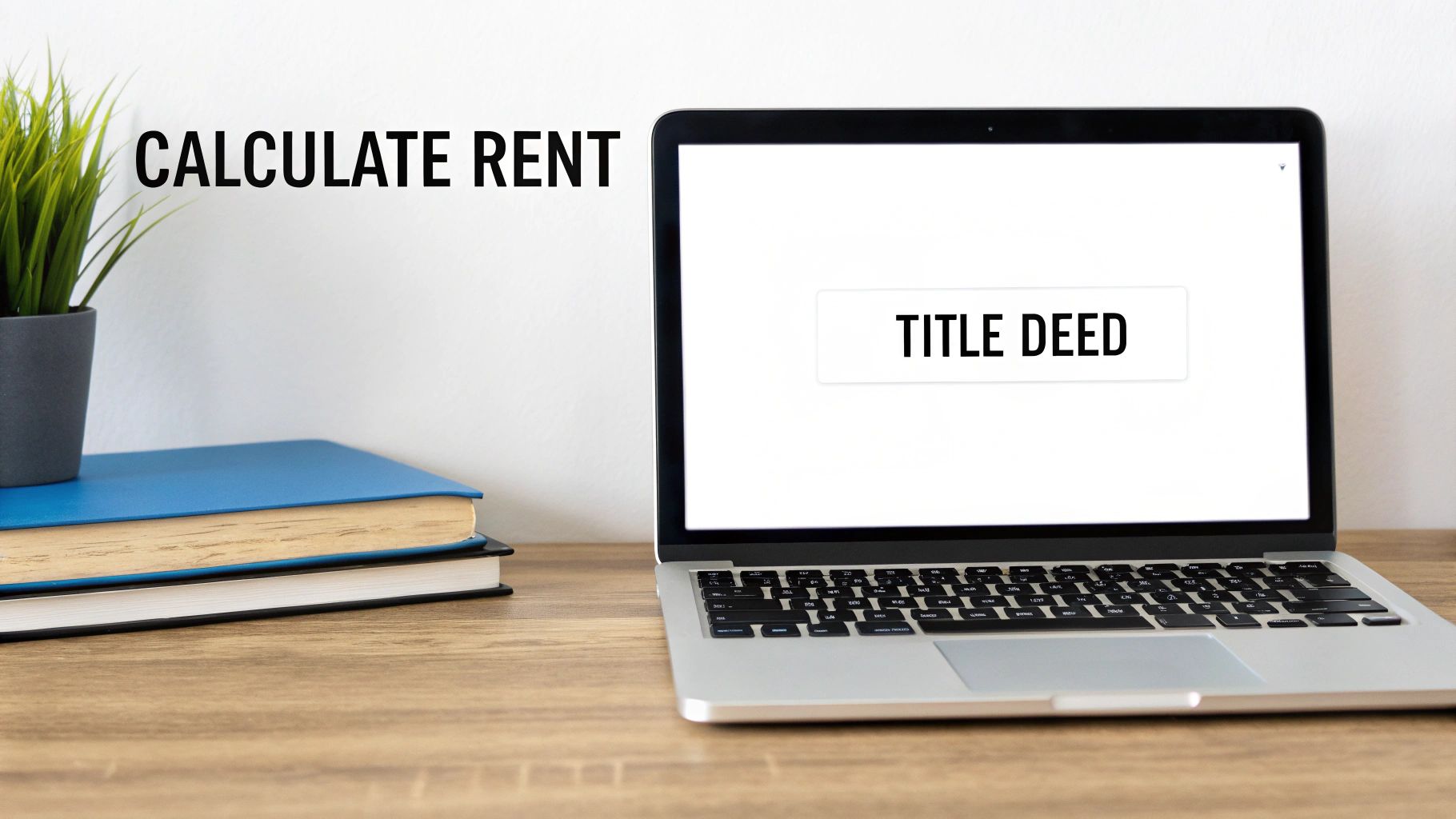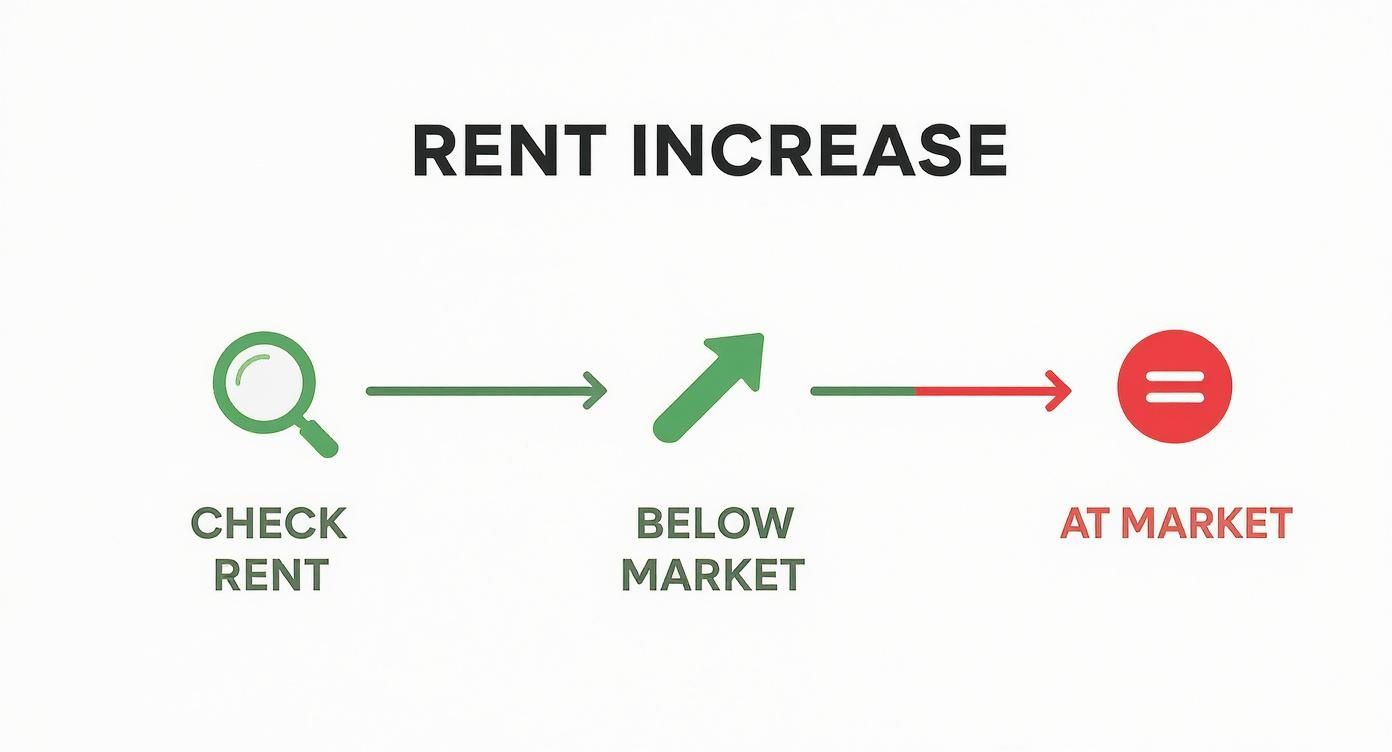Master the RERA Rental Price Calculator in Dubai
- Credence & Co.

- Oct 25, 2025
- 9 min read
Updated: Oct 28, 2025
Navigating Dubai’s dynamic rental market can feel like guesswork, but the RERA rental price calculator cuts through the noise. It’s the official, go-to tool for both tenants and landlords, created by the Real Estate Regulatory Agency (RERA) to bring much-needed clarity to tenancy agreements. Think of it as your data-driven benchmark for what’s fair.
Decoding Dubai's Rental Market with RERA
At its core, the RERA rental calculator equips you with official data. This allows you to confidently check if your rent is reasonable, see what kind of increase is legally permissible, and walk into negotiations with solid facts, not just feelings. It was specifically designed to foster transparency and fairness, especially when the market is fluctuating.
For a deeper dive into the mechanics of property values here, you can check out our comprehensive guide on https://www.cnco.ae/post/dubai-property-valuation-explained.

This simple tool is surprisingly powerful. It plays a huge role in preventing disputes and creating a more stable rental environment for everyone.
It empowers tenants by giving them an official benchmark to see how their rent stacks up against market averages.
It guides landlords on setting prices that are both competitive and compliant with RERA regulations.
It minimizes disputes by making sure renewal talks are based on impartial data instead of personal opinion.
How It Fosters Transparency
The calculator works by comparing your current rent to the average market rate for similar properties in your specific area. The result it generates isn't just a number; it directly corresponds to the legal framework governing rent increases. For example, if your rent is 10% or less below the market average, no increase is allowed. If it's 11% to 20% below, a 5% increase is the maximum permitted.
This system became absolutely essential as Dubai’s rental market heated up, providing a clear and predictable structure for rent adjustments.
The RERA calculator isn't just a suggestion; it's the foundation of Dubai's rental law. Its result dictates the maximum legal rent increase a landlord can request, making it a non-negotiable part of any tenancy renewal.
While the RERA tool is the official source for Dubai, it's also helpful to see how other markets approach this. You can explore other fair market rent calculators to get a broader perspective on valuation methods. Understanding these tools helps build a more complete picture of how rental pricing works.
A Practical Walkthrough of the RERA Calculator
First things first, you'll need to head over to the Dubai Land Department (DLD) website and find their e-services portal. That’s where you'll find the RERA rental calculator, which they officially call the Rental Index. Getting to the right page is the starting point for finding out what your rent should be.
The tool itself is pretty clean and user-friendly. You'll see a form asking for specific details about your property. Before you start, it’s a good idea to have your Title Deed and current tenancy contract (your Ejari) handy. The more accurate the information you put in, the more reliable the result will be.
Here's what the calculator's main screen looks like when you first open it. This is where the magic begins.

As you can see, it asks for the basics—property type, location, and the number of bedrooms—to pull the right data and give you a solid valuation.
Getting Your Property Details Right
Let's run through a real-world example to see how this works in practice.
Imagine you're renting a two-bedroom apartment in Dubai Marina, and your renewal is coming up. You want to be prepared for the conversation with your landlord.
Here’s exactly what you’d plug into the form:
Contract End Date: Pop in the date your current tenancy agreement expires. This is key because the index is updated regularly.
Property Type: You’ll select 'Residential' and then 'Apartment'.
Area: Find and choose 'Dubai Marina' from the list.
Property Sub Type / Number of Bedrooms: In this case, '2 Bedrooms'.
Current Annual Rent: Enter the exact yearly rent amount listed on your Ejari.
Once everything is filled out, just hit 'Calculate'. In an instant, the system compares your inputs against the DLD’s massive, up-to-date database of registered contracts.
The output you get is only as good as the information you put in. Always double-check that you've selected the correct community and property size. A simple mistake here can throw off the entire valuation, leaving you with a number that won't hold up in negotiations.
This takes all the ambiguity out of the equation. Say you entered your current rent as AED 120,000. The calculator will immediately check this against the going rate for similar two-bedroom apartments in Dubai Marina. It will then display the average market rent and, crucially, tell you the maximum increase your landlord is legally allowed to ask for—if any.
Making Sense of Your Calculator Results
You've punched in your details and hit 'Calculate'. Now, you're looking at a set of numbers. So, what do they actually mean for your upcoming tenancy renewal? This isn't just a casual suggestion; the figure you see is a powerful, legally recognized benchmark that sets the stage for any rent negotiations.
The calculator's primary job is to show you the average market rent for a property just like yours, in your specific neighborhood. It then stacks that number up against what you're currently paying. This comparison is what determines whether your landlord can legally ask for more money. It’s designed to cut through the noise and make the process transparent for everyone involved.
What's a Fair Rent Increase?
The logic is straightforward: how much your landlord can raise the rent depends entirely on how far below the market average your current rent is. It’s a tiered system designed to keep increases proportional and prevent sudden, drastic hikes. This framework, established by Decree No. 43 of 2013, is updated annually to reflect current market conditions.
Here’s a quick breakdown of the rules in a table format to make it crystal clear.
Permissible Rent Increase Based on Market Value
Current Rent vs Market Average | Maximum Permissible Rent Increase |
|---|---|
Less than 10% below market average | No increase is allowed. |
11% to 20% below market average | 5% increase is allowed. |
21% to 30% below market average | 10% increase is allowed. |
31% to 40% below market average | 15% increase is allowed. |
More than 40% below market average | 20% increase is allowed. |
Essentially, if your rent is already close to the market rate, you're safe from an increase. The further below the average you are, the larger the potential adjustment.
Let's put this into a real-world context.
Imagine the RERA calculator shows the average rent for your two-bedroom apartment in Dubai Marina is AED 120,000 per year. Your current rent is AED 100,000. That means you're paying about 16.7% below the market average. Based on the rules, your landlord is entitled to propose a 5% increase at renewal.
This data is your best tool in any renewal discussion. While the calculator is perfect for understanding rental rights, a full professional property valuation can offer a much deeper financial insight, which is especially useful for property owners mapping out their long-term investment strategy.
Leveraging the Results in Rent Negotiations
Once you have the official output from the RERA rental price calculator, you're holding more than just a number—you have leverage. This data shifts the entire dynamic of a rent negotiation. It's no longer about opinions or what one person thinks is fair; it becomes a straightforward conversation grounded in official figures from the Dubai Land Department (DLD).
Think of the calculator's report as a neutral third party in the room. It lays out the facts, providing a clear, unbiased benchmark for what's permissible under Dubai law. This is incredibly useful whether you're a tenant facing a steep hike or a landlord looking to adjust the rent to market value. The key is to approach the conversation calmly and professionally. The goal isn't to win a fight, but to land on a fair agreement that everyone can stand by.
Strategies for Tenants
Let's say your landlord sends a renewal notice with a rent increase that seems way off. If the RERA calculator shows that the proposed rent is higher than what's allowed, you have a solid foundation to open a discussion.
Your first move should be clear and respectful communication. Put together a polite email or ask for a quick chat, and make sure you have a PDF of the RERA calculation handy. You could open with something like: "Thanks for sending over the renewal notice. I've taken a look at the official RERA rental index for our unit, and it seems to suggest a different figure is applicable. Would you be open to discussing it?"
This simple, fact-based approach immediately sets a professional tone. It shows you've done your homework and takes the emotion out of the equation.
Justifying Increases for Landlords
On the flip side, if you're a landlord and the calculator confirms you're entitled to an increase, that same data is your best friend. Instead of just sending a new number and waiting for a reaction, be proactive.
When you send the renewal offer, attach the RERA report right from the start.
A clear, upfront statement works wonders. Try something like this: "As per the attached DLD rental index report for our property, a rent adjustment to AED [New Amount] is in line with current market rates and permissible regulations."
This provides instant transparency and justifies your position from the get-go, dramatically cutting down the chances of a back-and-forth dispute.

This infographic neatly shows how the negotiation path changes depending on whether your current rent is above, below, or right at the market average. It all comes back to the data. This approach is central to navigating the dynamic property market growth in Dubai and its regulations. Using the calculator's results the right way ensures any rent adjustment is fair, transparent, and legally sound, which ultimately helps build better relationships between landlords and tenants.
Getting an Accurate Result: Common Pitfalls to Avoid
The RERA rental calculator is a fantastic tool, but its accuracy completely depends on the details you feed it. Think of it as "garbage in, garbage out." Even a small slip-up can throw off the final number, which isn't ideal when you're heading into a lease negotiation.
One of the easiest mistakes to make is getting the property specifics wrong. I've seen it happen—someone picks 'apartment' for a duplex or uses an old Title Deed number. These details seem minor, but they're how the system finds comparable properties. When the inputs are wrong, you're not comparing apples to apples, and the valuation will reflect that. A good grasp of basic data quality best practices is surprisingly helpful here.
Nailing Down Your Property Details
When it comes to location, you have to be precise. Simply choosing a general neighborhood won’t cut it. Your Title Deed will have the exact community or building name, and that's what you need to use.
Community vs. Building: Take a place like Dubai Marina. Rent in one tower can be vastly different from the one next door, so specificity is key.
Property Configuration: Be honest about the bedroom count. A "two-bed plus study" is not a three-bedroom apartment in the eyes of the calculator, and mixing them up will skew your results.
The entire system is powered by the massive Rental Index database from the Dubai Land Department (DLD) and RERA, which cross-references your information against countless actual, registered tenancy contracts.
To put it in perspective, a property in Downtown Dubai might command anywhere from AED 90 to AED 140 per square foot, while a similar-sized unit in a newer community could be closer to AED 50 to AED 70. Getting your details right ensures the calculator pulls from the correct data pool for a truly relevant valuation. You can learn more directly from the DLD’s Rental Index to understand how it brings transparency to the market.
Got Questions About the RERA Calculator? We've Got Answers.
Even a simple tool can have its quirks. If you've been using the RERA rental price calculator, a few questions have probably crossed your mind. Let's clear up some of the most common ones so you can use it confidently.
How Often Is the Rental Data Updated?
This is probably the biggest question I get. The RERA rental index isn't updated in real-time; the Dubai Land Department officially updates it annually. This keeps the data relevant to what's actually happening in the market.
My advice? For the most reliable valuation, always run your numbers right before your tenancy renewal is due. That way, you're working with the freshest data available.
What if My Landlord Ignores the Calculator?
This is where things can get tricky. Let's say your landlord wants to hike the rent by an amount that's way over what the calculator says is permissible. The law is on your side here—you don't have to agree to an increase that exceeds the official RERA limit.
Your first move should always be a calm, professional conversation. Download the official report from the DLD website and share it with your landlord. It’s hard to argue with the facts. If they still won't budge, your next stop is the Rent Disputes Settlement Centre.
Remember, in any formal dispute, the result from the RERA calculator is the gold standard. It’s the official benchmark the authorities lean on to decide what's fair, which gives you a powerful piece of evidence.
Does the Calculator Work for Every Property?
For the most part, yes. The calculator covers almost all residential, commercial, and industrial properties in Dubai. The accuracy, however, really comes down to the details you enter.
While it's the undisputed starting point for any rental valuation, it's worth noting that very unique or ultra-specialized properties might not have a perfect one-to-one match in the index. The key is to be as precise as you can with your inputs to get the most accurate result possible.
For expert, RERA-accredited valuations that go beyond the calculator, trust Credence & Co. Our team provides unbiased, technically robust opinions to help you de-risk decisions and optimise outcomes. Explore our professional valuation services today.

Comments